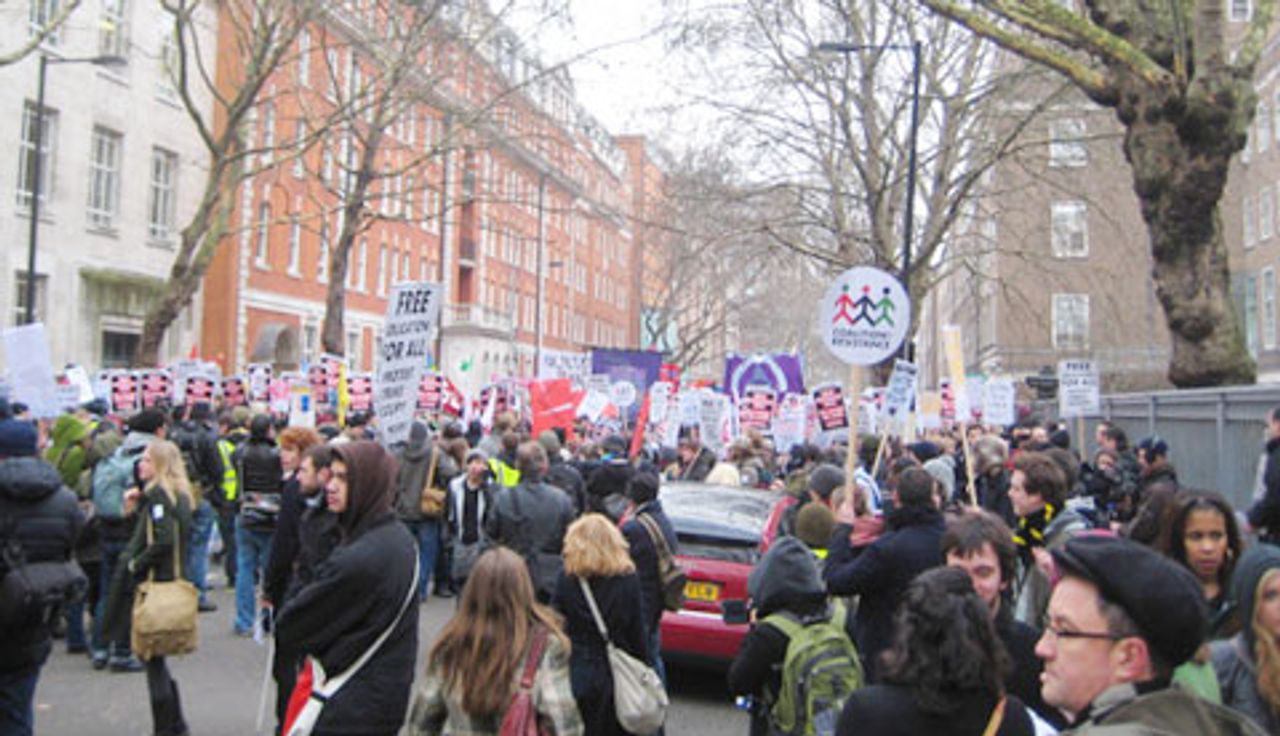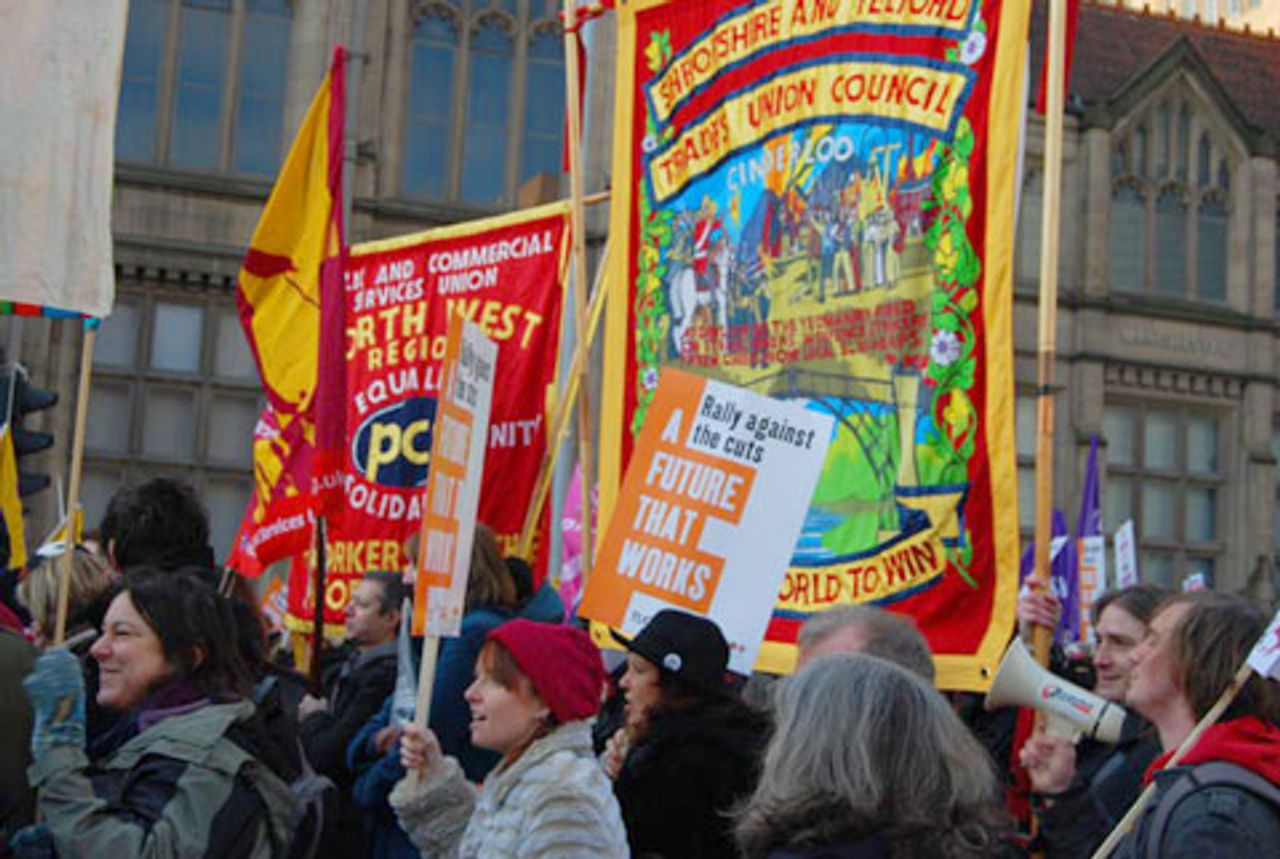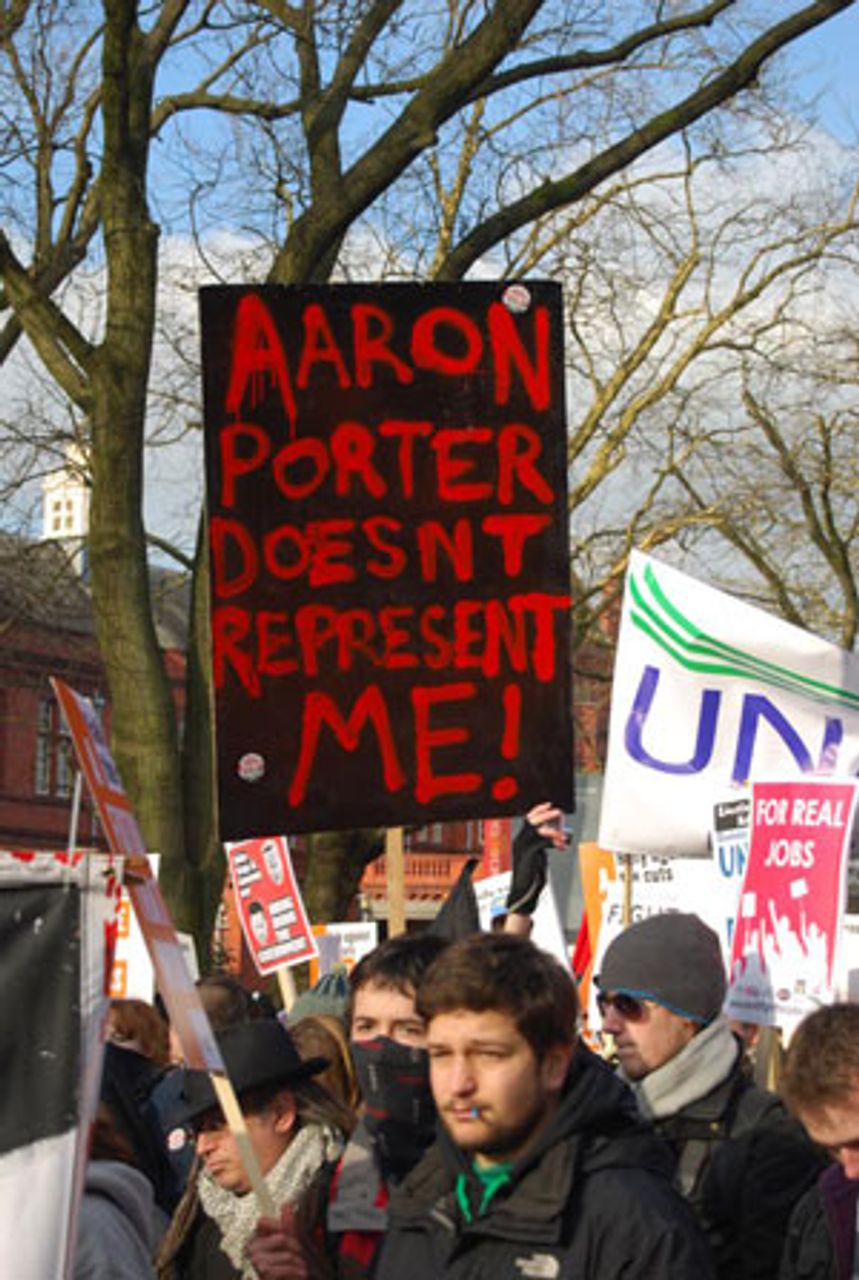 London demonstration
London demonstrationDemonstrations took place in London and Manchester on Saturday against the rise in college student tuition fees and the axing of the Education Maintenance Allowance (EMA) for 16- to 19-year-olds. The Conservative/Liberal Democrat government passed legislation in December slashing college and university budgets, tripling university tuition fees to £9,000 and depriving school students of their weekly £30 grant.
Despite inflated claims by the organisers, the number of participants on Saturday was small—5,000 in London and a maximum of 2,000 in Manchester. This must be compared to protests at the end of last year that saw tens of thousands take to the streets, occupy colleges and take over the Tory Party headquarters in London. Students, lecturers and schoolchildren were involved in the nationwide protests, in opposition to the National Union of Students (NUS), which from the outset refused to organise any struggle to oppose the cuts.
Under conditions of the growing alienation of young people from the NUS, the Labour Party and the trade unions, these forces and their fake left hangers-on directed all their efforts to bringing the movement back under official control. Students were told to put pressure on the Conservatives and Liberal Democrats to retain the EMA and rethink the fee increases. They were instructed to write letters to government MPs. As a result, the movement petered out.
 Manchester demonstration
Manchester demonstrationThe Manchester demonstration was organised by the Trades Union Congress (TUC), the University and Colleges Union (UCU), the NUS and the Labour Party creation Save EMA. It was held under the title “A Future that Works”. The event was billed as part of the build-up to the TUC’s “March for the Alternative” on March 26. The demonstration was mainly made up of trade union functionaries and various ex-radicals, with union banners from Manchester and Merseyside, Scotland, Bristol, Shropshire, and Lancaster. Few students were present.
 Banner opposes National Union of Students president
Banner opposes National Union of Students presidentAt the beginning of the demonstration, NUS president Aaron Porter was barracked, with attendees yelling “You’re a Tory too”. Porter’s deputy, Vice-President Shane Chowan was also unable to finish his speech due to booing. In reporting these events, the Telegraph newspaper distorted the character of what happened by claiming people were chanting “you’re a Tory Jew”, implying that the demonstration had anti-Semitic overtones.
Various union bureaucrats spoke, including supposedly left-wing Fire Brigades Union General Secretary Matt Wrack. Just before last year’s student demonstrations, Wrack called off a strike of London firefighters, paving the way for job cuts and changes to work patterns. Sally Hunt, the general secretary of UCU, which has done little or nothing to mobilise its membership against the cuts to education, declared, in a demagogic speech, “This is a government at war with our young people and therefore at war with our future. It is betraying an entire generation”. She offered no perspective on how to oppose this government.
The London demonstration, organised by the Socialist Workers Party’s (SWP’s) Education Activist Network and the Socialist Party’s (SP’s) National Campaign against Fees and Cuts, was also supported by the UCU executive and the Public and Commercial Services civil servants’ union. The two groups enjoy a dominant role on the respective executive committee of these two unions. However, there were only a handful of union banners to accompany the activists and students. The demonstration marched past parliament to end at the Conservative Party headquarters at Millbank Towers, which was surrounded by huge numbers of police.
Clashes took place after police kettled demonstrators for hours. Some were injured and dozens arrested. Some protestors marched to the Egyptian embassy, where a protest was being held calling for the overthrow of the Mubarak regime.
 Mark
MarkMark, a student from Preston studying maths, history, physics and chemistry at Lancaster Grammar School, said he was at the demonstration “to protest against the health reforms that are going to ruin our NHS and also the Liberal Democrat lies before the election. This government knows the price of everything but the value of nothing.”
He is hoping to go to university, but the £30,000 worth of debt “puts him off, and with my EMA being cut, I don’t know if I’ll actually be going to college next year.”
Ridwan, a recent graduate from Manchester Metropolitan University, said the attacks on education “are going to affect my brothers and sisters. We’ve got all of them going to university. We can’t afford the £9,000 term fees. I was one of the lucky ones. I didn’t have to pay them.”
Asked about employment since she graduated, Ridwan replied, “Its really hard to find a good position. All the graduate schemes are gone, so it’s been hard. I am not working now.”
Jack is in his first year studying law at Liverpool University. He said, “I am deeply concerned that after working so hard in college and now at university, at the end of it all I won’t have a job, never mind one in law that would give me an income that compensates for all my hard work and sacrifice. My friends are all out of work or earning buttons on part-time schemes, but at least they wont have a massive debt hanging over them for years.
“My Dad talks to me a lot about the Thatcher years, but he says what’s in store for us under the coalition makes those years seem like heaven. He is waiting for a report on today. I listened to the speeches today, and frankly, none of the speakers impressed me. They all sounded the same, and you could see the crowd was unimpressed. Almost from the start, people began to walk away. They ranted against the present government, but kept quiet about the Labour government’s record. It was all so dishonest. I expected more.”
 Anton
AntonAnton Kahlil, a 16-year-old A-level student at Moretto College, Manchester, said, “The reason why I am here is everyone my age is unhappy about the way the coalition is imposing the cuts. A lot of the youth are lost about what to do. I have got many friends who were set on going to college and university, but with the dropping of the EMA and raising of fees to £9,000 have dropped out of college because the threat of debt. And even if they complete their course, they know there is a huge lack of jobs.
“In November, a lot of students from my college walked out of lessons to join the demonstrations against the proposed abolition of EMA. A lot of younger people came out. I think it’s good that they can get a lot of support and come together in the end, but I think there’s a limit as to what a difference the demos can make. Support is waning if we can unite with other countries in Tunisia and Egypt and do something bigger and more radical to force the government’s hand.”
Abbey McDougall, studying pharmacy at the University of Central Lancashire, said, “I am hoping to work in the National Health Service, but in the lectures about the structure of the NHS we are being told that everything is up in the air as there may not be an NHS. I’ve no idea where I’m going to be when I finish my degree. I don’t want to be a business manager, but a health care professional to help people.
“The history of the NHS is that it was set up to be free on the basis of fairness, equality and justice. This code of ethics is being taught, but it is not the career I’m going to start off in.
“The cuts are affecting families across the board. I am particularly concerned about the cuts for respite for children with disabilities. Being a mother myself, it must be so stressful to have a child with profound disability. There is the recent case of the mother of a six-year-old who is now requesting her child go into care because the respite funding is being cut.
“They are taking away people’s dignity. I could be in a position of turning away people who need antibiotics because they can’t pay for them, which I don’t agree with.”
Amy and Suzanne are music students at the Royal Scottish Academy of Music and Drama in Glasgow. Suzanne said,” I came here today to stand in solidarity against all the austerity cuts, not just that of student fees. There are elections in Scotland in May, and the Scottish National Party is talking about putting fees up to £6,000 for English students. I think it’s discriminatory against English students”.
“At present, they are reining in the funding for music education. In Fife, where I’m from, there is a 50 percent cut in schools’ music education. Instrumental tuition is being cut, and I’m an instrument teacher, so the prospects for jobs are dire.
“I think it’s important that children and young people thrive in the arts. As a classical music teacher, it means so much to teach it to working class kids. Classical music will become an elitist subject only for those who can pay.”
Amy added, “My brother’s school has just cut music tuition. By cutting this provision, they are denying working class people extra-curricular access to cultural subjects.”
Fill out the form to be contacted by someone from the WSWS in your area about getting involved.
